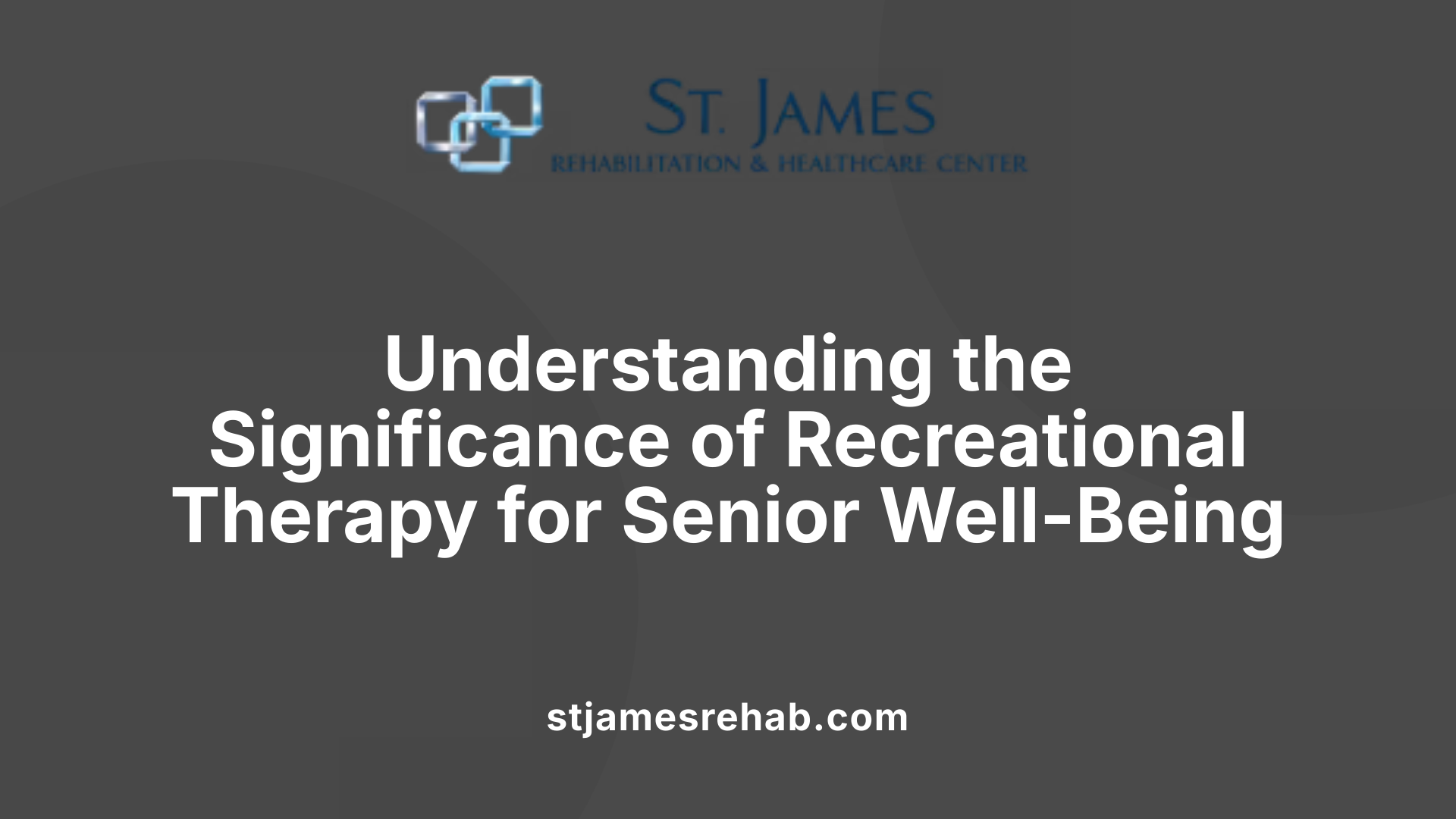How Recreational Therapy Helps Manage Stress in Seniors
Harnessing the Power of Recreational Therapy for Senior Stress Relief

Exploring the Therapeutic Benefits of Recreation
Recreational therapy is gaining recognition as a vital component in managing stress and enhancing the quality of life for seniors. By engaging in purposeful and enjoyable activities, older adults can experience significant improvements in both their physical and mental well-being. This form of therapy shines a light on the importance of activity-based interventions that cater to the unique needs of seniors, promoting their health and happiness while mitigating the stressors often associated with aging. Let's delve into the benefits, activities, and evidence supporting the effectiveness of recreational therapy in senior stress management.
Recreational Therapy: A Key to Senior Well-being

Why is recreational therapy important for older adults?
Recreational therapy is vital for older adults as it significantly enhances their mental and physical well-being through various tailored activities. It allows seniors to reconnect with past interests or discover new passions. This engagement can boost both cognitive function and emotional health, helping to mitigate the effects of age-related decline.
Participation in activities such as arts and crafts, games, music, and outdoor exercises encourages socialization. This is particularly important as it reduces feelings of isolation and loneliness, which can contribute to cognitive decline and depression among seniors.
Moreover, recreational therapy plays a significant role in promoting physical health. It improves mobility, balance, and flexibility, while providing avenues for mindfulness and stress reduction. Activities like yoga and outdoor gardening not only promote fitness but also have a calming effect, contributing to emotional stability.
In essence, recreational therapy fosters a sense of community, purpose, and independence among older adults. It is crucial for maintaining a quality life as individuals age, helping them feel more connected and fulfilled through enjoyable activities that promote overall health.
Stress Alleviation and Quality of Life Enhancement

How can recreational therapy alleviate stress and enhance the quality of life for seniors?
Recreational therapy significantly alleviates stress and enhances the quality of life for seniors through engaging activities that are tailored to their interests and abilities. Various options like arts and crafts, music therapy, and outdoor activities not only promote physical movement but also provide a mental workout.
- Physical Movement: Activities such as dancing, swimming, and chair yoga facilitate physical fitness, enhancing mobility and strengthening Seniors' bodies while releasing endorphins, natural stress relievers.
- Cognitive Stimulation: Brain exercises, including crossword puzzles and memory games, help maintain cognitive functions and can potentially slow cognitive decline associated with aging.
- Social Interactions: Group activities encourage socialization, mitigating feelings of loneliness and isolation. Through structured interaction, seniors build emotional bonds that contribute to their mental well-being.
- Sense of Purpose: Engaging in recreational tasks fosters a sense of mastery and accomplishment, improving self-esteem while promoting mindfulness in daily routines.
Incorporating these activities into their lives can substantially elevate happiness, enhance physical health, and strengthen emotional resilience among seniors, leading to an overall improvement in quality of life.
Recreational Therapy's Role in Dementia Care

What are the benefits of recreational therapy for dementia patients?
Recreational therapy offers numerous benefits for dementia patients by serving as a vital nonpharmacological intervention that can significantly reduce behavioral symptoms.
Therapists tailor activities to match the patient's unique interests and abilities, promoting higher engagement and stimulation. Common therapeutic approaches include:
- Music therapy: Known for its ability to evoke memories and enhance emotional connections, music therapy can uplift patients and reduce anxiety.
- Sensory stimulation: Engaging the senses through various activities can spark joy and awareness, which is crucial for improving the quality of life.
Evidence indicates that recreational therapy can effectively reduce agitation and improve mood, notably when minimizing medications that may limit engagement.
Moreover, interdisciplinary collaboration among healthcare providers enhances the program's success, ensuring that activities are relevant and continuously provided. This ongoing engagement is essential for sustaining the positive impact on dementia patients' emotional health and overall quality of life.
Incorporating recreational therapy not only addresses cognitive decline but also cultivates a sense of companionship and belonging in patients, which is vital for their well-being.
Cognitive and Social Benefits of Recreational Therapy

How does recreational therapy support cognitive stimulation and social engagement among elderly individuals?
Recreational therapy plays a crucial role in enhancing cognitive stimulation and social engagement among seniors. It does so by incorporating a variety of carefully designed activities that challenge the mind.
Cognitive Stimulation: Activities such as puzzles, brain teasers, and arts and crafts serve as effective cognitive exercises. These activities encourage seniors to think critically, which can help slow cognitive decline and maintain brain function. Studies show that engaging in games and machine-based brain training activities can decrease the risk of dementia by up to 29%. Furthermore, recreational activities that stimulate memory and attention, like solving crossword puzzles, also contribute to cognitive health by keeping the mind sharp.
Social Engagement: Recreational therapy fosters social connections through group activities that significantly enhance social interactions. Engaging in events such as bingo, dance classes, or communal art projects creates opportunities for relationships to flourish, counteracting loneliness and isolation. Evidence from therapeutic recreation programs reveals improved social well-being, where participants report better emotional bonds and a greater sense of belonging.
Additionally, shared experiences in recreational settings instill a sense of purpose and accomplishment in seniors, which is essential for their overall mental health. By addressing cognitive challenges and fostering social ties, recreational therapy promotes a holistic approach to elderly wellness.
The Multidimensional Impact of Recreational Activities

Physical, Emotional, and Spiritual Health
Engaging in recreational activities greatly enhances the physical health of seniors. Activities such as walking, swimming, and chair yoga improve mobility, strength, and flexibility, ultimately helping seniors maintain their independence. Moreover, such exercises stimulate the release of endorphins, which naturally alleviate stress and anxiety.
On an emotional level, creative pursuits like art and music therapy provide seniors opportunities for self-expression, allowing them to navigate complex feelings such as loss or loneliness. The act of creating or participating in music-based activities can uplift mood and foster a sense of accomplishment.
Overall Well-being and Stress Management
Recreational therapy plays a critical role in managing stress among seniors. Group activities help reduce feelings of isolation, enhancing social interaction and leading to strengthened community bonds. For example, activities like group gardening or animal therapy enrich emotional well-being, while immersive hobbies provide therapeutic outlets.
Further, engaging in games and puzzles improves cognitive functions, potentially reducing dementia risks by up to 29%. This not only promotes mental clarity but also provides a distraction from daily stressors, reinforcing overall mental health.
In short, recreational activities intertwine the physical, emotional, and cognitive aspects of well-being, effectively addressing the complexities of stress in seniors, thereby contributing to their quality of life.
Conclusion
Recreational therapy stands as a beacon of hope and practicality for seniors seeking to manage stress and enhance their quality of life. By embracing a holistic approach that intertwines physical activity, cognitive challenges, and social engagement, recreational therapy offers a comprehensive solution that addresses the multifaceted needs of aging individuals. With evidence supporting its effectiveness, this therapy not only alleviates stress but also improves mental health, fostering a brighter, healthier future for seniors. Empowering older adults through meaningful recreational activities will continue to be an invaluable tool in their journey to maintain independence, vitality, and joy in their golden years.
References
- How Recreational Therapy Can Help Seniors Stay Active ... - Arbors
- Recreational Therapy for Older Adults - CareHop
- Recreational Therapy: A Path to Holistic Well-Being for Seniors
- How Recreational Therapy Enhances Senior Well-Being
- Recreation is More Than Fun and Games in PACE - Innovage
- Benefits of Recreational Therapy - Options for Senior America
- Recreational Therapy: Boosting Physical and Mental Wellness
- Sante Recreational Therapy - Santé Cares





